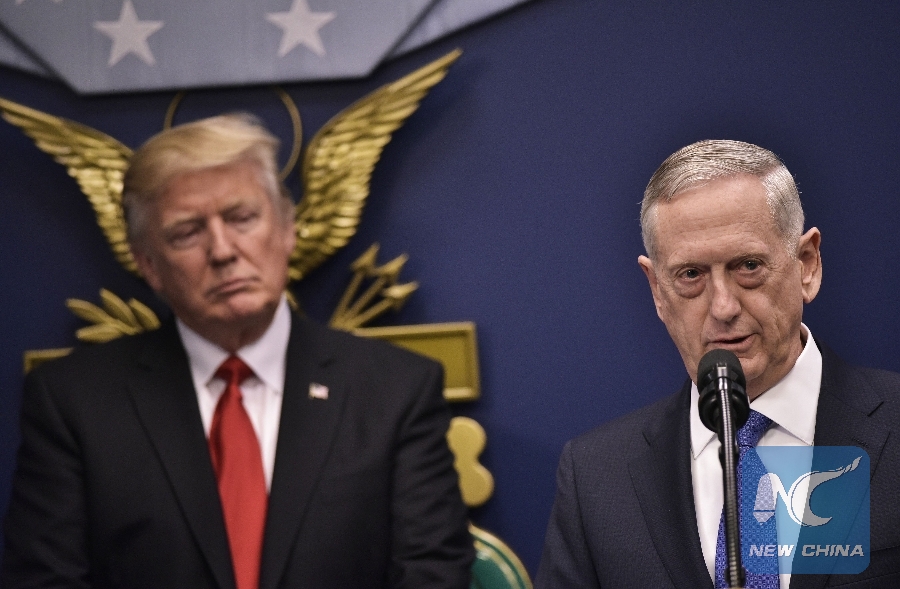
File Photo: U.S. Secretary of Defense James Mattis speaks after his ceremonial swearing-in as secretary of defense watched by U.S. President Donald Trump on Jan. 27, 2017 at the Pentagon in Washington, D.C. (Xinhua/AFP)
WASHINGTON, Dec. 20 (Xinhua) -- U.S. President Donald Trump said Thursday that Secretary of Defense Jim Mattis will "retire" at the end of February, an announcement the Pentagon later confirmed by publishing its chief's resignation letter implying differences with the president.
Mattis will "be retiring, with distinction," after having served the administration as the defense chief for the past two years, Trump tweeted.
"During Jim's tenure, tremendous progress has been made, especially with respect to the purchase of new fighting equipment," the president tweeted.
He added that a new secretary of defense "will be named shortly."
There have been rumors for a long time that the relationship between Trump and Mattis wasn't smooth, but the president didn't mention his disputes with Mattis or whether Mattis was forced to resign.
However, in a resignation letter to Trump dated Thursday, the defense secretary wrote "Because you have a right to have a Secretary of Defense whose views are better aligned with yours" on many subjects, "I believe it is right for me to step down from my position."
In the letter, the 68-year-old former Marine Corps general implicitly criticized Trump for his treatment of U.S. allies.
"One core belief I have always held is that our strength as a nation is inextricably linked to the strength of our unique and comprehensive system of alliances and partnerships," Mattis wrote.
He added that his views on "treating the allies with respect" are "strongly held and informed by over four decades of immersion in these issues."
Mattis's departure came one day after Trump ordered the withdrawal of the 2,000 or so U.S. troops from Syria and declared victory over the Islamic State militant group.
Senator Tom Cotton, a Republican from Arkansas and Jack Keane, a retired Army general who was an early supporter of Trump, are possible replacements for Mattis, according to media reports.
But both expressed their concern regarding Trump's decision of withdrawing U.S. troops from Syria. Keane called the move a "strategic mistake" on Twitter. Cotton was among the six senators who signed a letter to ask Trump to reconsider his decision.
Mattis and Trump were reported to have sat face-to-face on Thursday afternoon in the Oval Office, during which they talked about policy differences, including their differences on the withdrawal from Syria.
The Guardian newspaper said Mattis had persuaded Trump to agree to a gradual drawdown of troops and to leave a residual force of a few hundred. His resignation indicates that these recommendations were rejected by Trump.
Republican Senator Lindsey Graham, who had opposed Trump's decision to bring back U.S. troops from Syria, said Mattis "firmly" believes "the job in Syria is not yet done," according to a report by Fox TV.
But the scope of Mattis's divergence with Trump goes far beyond the U.S. military mission in Syria.
For instance, the Pentagon chief is a defender of the U.S. alliance with the North Atlantic Treaty Organization (NATO), while the president once bashed NATO for being "obsolete" and often scolded member countries for failing to contribute sufficient funds.
The two also disagreed on issues such as banning transgender recruits from the military, canceling the joint U.S.-South Korea military exercises, pulling the United States out of the Iran nuclear deal, as well as deploying troops to the U.S.-Mexico border.
Seen by his supporters as the only remaining source of stability in the Trump administration, Mattis is the latest in a slew of cabinet members who either resigned or were forced to quit within the last two years.
Mattis has widespread support across the political aisle. His stepping down was immediately lamented by incumbent and former national security officials.
"At a time of such political, economic, and geo-strategic turbulence -- both nationally and globally -- are you waiting for a catastrophe to happen before acting? Disaster looms!" John Brennan, former director of the Central Intelligence Agency, said of the Republicans in a tweet.
"This is scary. Secretary Mattis has been an island of stability amidst the chaos of the Trump administration," tweeted Mark Warner, a senior Democratic lawmaker from Virginia who serves on the Senate Intelligence Committee.
"As we've seen with the president's haphazard approach to Syria, our national defense is too important to be subjected to the president's erratic whims," he wrote.
In addition, Mattis, as a former Marine Corps general, is regarded highly among defense experts and is a well-respected military mind among lawmakers.
A poll conducted this September found that nearly 90 percent of U.S. military officers had a favorable view of his work.

